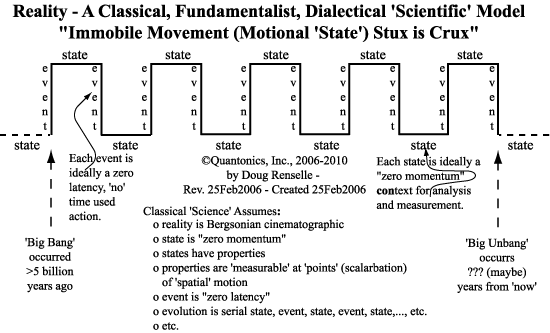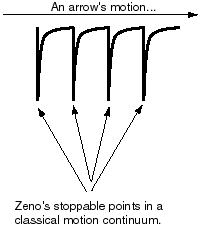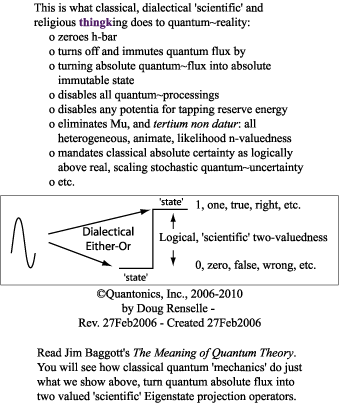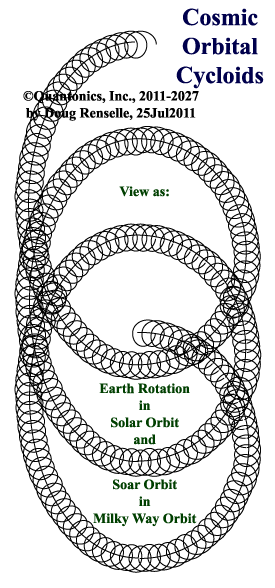|
Item |
English Language Problematic |
Quantonics' Quantum
Remediation
©Quantonics, Inc., 2001-2029
|
|
'o' |
Quantonics ch¤¤ses
t¤ c¤¤pt classical 'o' amd
remerq all
quantum comtextual occurrences with '¤.'
In classical contexts we shall use, e.g., 'to,' 'coopt,' etc.
In Quantonics/quantum comtexts we shall use, e.g., 't¤,'
'c¤¤pt,' etc.
We shall use single qu¤tes when referring these c¤¤pted
w¤rds, respectively, "¤ut ¤f con/comtexts."
We may ¤pti¤nally n¤t use '¤'
in terms ¤f prefixes already c¤ined ¤r c¤¤pted.
We may ¤pti¤nally n¤t use '¤' in
w¤rds which require capitalizati¤n amd
start with 'O.' We ch¤¤se n¤t t¤
use '¤' in pr¤per names amd ¤ther 'sacred'
w¤rds. Our reas¤ns f¤r ch¤¤sing
this appr¤ach include:
- 'o' is almost a de facto classical symbol for classical object,
which we wish to displace with Quantonic quanton,
- 'o' appears in countless classical English words, implicitly
offering Quantonics a means ¤f frequent refreshing ¤f
readers' quantum comtextual sensibilities amd
awarenesses,
- etc.
One way y¤u may ch¤¤se t¤ think
ab¤ut ¤ur use ¤f a quantum '¤' is
that it is a quantized classical 'o.' That is, we t¤¤k
a classical 'o' amd
put f¤ur little 'hash' quanta ar¤und its perimeter.
Page top index.
|
|
'object'
Etymology:
Object
n. before 1398 object tangible thing; borrowed from Old
French object, and directly from Medieval Latin Objectum
thing put before: (the mind or sight), neuter of Latin objectus,
past participle of obicere to present, oppose, cast in
the way of (ob. against + -icere. combining form
of to throw).
The meaning of a thing aimed at, purpose, goal, is first recorded
probably before 1425.—v. Probably about 1400 obiecten;
borrowed from Old French objecter, objeter, and
directly from Latin objectare to cite as grounds for disapproval,
frequentative form of obicere to oppose.
From Barnhart, Dictionary of Etymology.
Synonyms - classical:
- logic:
- material
- substantial
- above subject
- stable
- immutable
- unchanging - nonevolutionary
- independent
- excluded-middle
- negation
- value:
- dislike
- dissent
- opposition
- intention
- deprecation
- hindrance
- unbelief
- refute
- deny
Synonyms - quantum:
- illusion
- delusion
- oxymora
- quantum complement of subjæct
- ~sobject
|
: Object, etc.
Classically 'object' is above and before subject.
'Object' as may be seen from etymology to left, is a pure
dialectical 'form.'
See our QELP of object.
:
Objæct, etc.
Pirsig's MoQ inverts
classicism's O over S hierarchy. See our SOM
sVo animation.
Quantum reality, and nature's own manifestations show us memeotically
and hermeneutically that ontological process emphasizes qualitative
subjectivity (AKA "Valuation") and belies any classical
quantitative objectivity (AKA "scalarbation").
Pirsig's MoQ shows us how, what classicists call either
Subject or Object (i.e., dichon(S, O) and EOOO(S,
O)), is actually both Subject and Object (i.e., quanton(S,O)
and BAWAM(S,O)).
In Quantonics, classical objects are illusions, self delusions.
In Quantonics, objects do not exist, rather quantons exist. Quantons
are quantum complements of what classicists refer: both
objective and subjective. We use our quantonic script to illustrate
like this quanton(subjective_apparency,objective_apparency).
Quantonics ch¤¤ses t¤ c¤¤pt
classical 'object' amd
remerq all
quantum comtextual occurrences with 'quanton.'
See our QELP
object. See SOM
Issues. See SOM limitations.
See SOM Reality Loop.
See What is Wrong with
SOM Logic?
Page top index.
|
|
'occur'
Etymology - Classical: occur
Etymology - Quantum
Synonyms - Classical
- happen
- y=f(t) cartesian lisr
stoppable event
- arise
- transpire
- befall
- mental occasion as occurrence
- change as state
- change of constancy
- "movement by immobility"
- "movement as motion of non evolvables"
- etc.
Synonyms - Quantum
- happenings
- processings
- change as process
- change as adiabatic,
- change as n¤nadiabatic,
- apply those change quantum~complements to:
- change as Planck rate variability
- stindyanic evolutionings
- change as waves...flux
- change as omnitorable stochasticings
- metaentropa and metacohera as quantum~holographic metamorphing
of zeroentropic th~oughts
and posentropic emerscents (as actualizing, emerscenturing
quantum~th~¤ughts)
- etc.
|
It has taken Doug nearly ten years to build enough personal,
individual, quantum~gn¤stic qua,
enough personal, individual, quantum~gn¤stic quantum~wisdom, to take on this
QELR of 'occur.'
"Doug, why has it taken so long?"
Recall Doug's earlier omniscriptions of John
von Neumann's attempts to describe "quantum~special~events."
Recall Pirsig's almost normative, "Quality is an event."
Recall how it took Doug, from Quantonics' beginnings in about
1995 until about 2003, to fully accept Bohm's, Talbot's, Pietsch's,
and Pribram's memes of reality as holographic.
Then, only recently, Doug has been able to put quantum~probability (more generally,
stochastics)
in a quantum~enthymemetic
schema of supporting quantum~stochastics in terms of quantum~events
as quantum~pr¤cæssings. Doug's full acceptance of
that enthymeme didn't happen until Doug omniscovered ancients'
quantum~gn¤stic memes of "redemption as quantum~pr¤cæss."
See Doug's extensive omniscussion on Commutativity
and Enthymemetics at our CeodE
2002 EPR table.
Doug didn't have a problem of describing classical 'events'
and all their apparently unbounded problematics! We list many
of those problematics under our QELR link to 'event,' above.
Doug had a problem of describing, generally what historically
has been labeled, 'quantum~event' as quantum~pr¤cæss.
What our goal has been, ever since we made this 'occur' entry
in our QELR quantum~vis-à-vis~classical lexicon, is to
ethically and skillfully (i.e., n¤n dialectically) describe
what we intend when we say "quantum~ævænt,"
and "quantum~occurrence." Doug feels con(m)fident he
is ready to do that now, CeodE14Dec2008.
Allow us to make a penultimate observation. Occurrence and
event are quasi duals of one another, so whatever we describe
for 'event' will likely apply to 'occur,' and vice versa.
: occur, occurred, occurrence, occurs, etc.
Classically, an 'occurrence' is a, posentropic-only, state
change, a change of state. Trouble is that classical change
is an always 'non'
adiabatic event which is zero latency. 'Zero latency' is classical
dialectical 'science'
and 'philosophy' disabling quantum~reality, turning off Planck's
frequency, disabling Planck's reality clock. Doug's use of 'zero
latency' in that last sentence is purely classical. Temporality
and atemporality have entirely omniffering
semantics in classical 'contexts' vis-à-vis quantum
comtexts. Time is homogeneous in classical contexts and
heterogeneous in quantum comtexts. Atemporality
is 'total absence of time (as a classical posentropic-only-proxy
for change)' in classical contexts (strawmen versions
like SOM) and n¤nl¤cal
correlation (e.g., gravity, and zær¤ lahtæncy
spatially~arbitrary signaling)
in quantum comtexts. Doug - 9,28Dec2011.
Why? Classicists have made some terrible assumptions about
how change is adequately 'described' 'simply' as 'change of state.'
Stoppability is presumed! State permits ideal scalarbation (measurement
of that which is stopped: state-ic).
Classicists deny real, natural, evolutionary process as a
means of describing occurrences.
Take a look at these graphics:
HotMeme™ "Classical Time is a Monism. Monism is Deceit."™
HotMeme™
Doug - 8Jan2009.
|
Ideal Classical
Fundamentalist Science Modeled as a Monotemporal 'Process' Pluralism
of Ideal 'States,' and Ideal 'Events.' |
 View classical 'events' here as classical 'occurrences.'
View classical 'events' here as classical 'occurrences.'
|
 View classical stoppability 'events' AKA 'point
occurrences' here as zero latency.
View classical stoppability 'events' AKA 'point
occurrences' here as zero latency.
|
 |
Zeno's Stoppability
Modeled as Alterations of:
- Stop...
- Unlimited Acceleration
- Stop...
- Unlimited Acceleration
- etc.
|
Ideal Classical
Fundamentalist Science and Religion Mapping of Quantum Flux onto
Ideal 'States.'
A Digital Reality.
A Dialectical Reality!
|
Bottom line, based upon those graphics and Doug's omniscriptions
of those graphics, classical dialectic and analytic notions of
'occur' and 'occurrence' are simply bogus. Why? Reality isn't
static. Reality
is relentless, forever changing, adapting and evolving quantum
flux.
:
¤ccur, ¤ccurred,
¤ccurræncæ, ¤ccurs, etc.
Quantum~occurrencings are quantum~stochastic quantum~processings.
That sentence puts extraordinary limitationings on what we
can call an "occurrence," and an "event."
We say that like this, "Quantum~occurrences have Value."
To say that more absolutely in terms of:
- quantum~comsistency as always fluxing , and
- quantum~completeness as fluxes all,
...we say,
"Quantum~¤ccurræncæs
aræ ihn Valuæ amd Valuæ
issi ihn Quantum~¤ccurræncæs."
Doug, what does that mean?
Value is re cognizable. Latter means we need a growing, evolvable
holographic network of patterns which we may compare with
omnique value impinging upon a given hologram.
An
omnique value may not be re cognizable, if it is impinging first
time ever on said hologram. If omnique value recurs, it then
becomes a recognizable recurrencing.
Holograms adiabatically cognize omnique value, and adiabatically
recognize recurrent valuings.
So we must quantumly omnistinguish omnique value occurrences
and similar valuings' recurrencings.
In a familiar quantum~environment recurrencings (equilibria)
predominate. In an unfamiliar quantum~environment, initially,
occurrencings (chaos) predominate and gradually decline (quantum~gradient
rapid
decay of chaos
back into equilibrium)
as they evolve into quantum~autsimilar~recurrencings (equilibria).
In quantonicsese, quantonics script, we may narrate chaos
nissin equilibria.
All recurrencings are similar prior recurrencings, but they
are never 'identical'
to prior recurrencings. An implication is that all holograms
must adapt and coadapt to relentless quantum~evolution
of pattern valuings in their rqcs~environmentings.
We can summarize what we have so far in a...
Quantonics' Holographic
HotMeme™
"Our quantum~stage hologramings'
Quality depends upon their qua to be relentlessly doing cognizings,
recognizings, and adaptively omniscriminatings their
quantons(holographings_complementings_otheringsj,holographings_complementings_selfingsk)."™
Quantonics' Holographic HotMeme™.
Readers please cognize and recognize how autsimilar
Doug's words are to Autiot!
Let's establish a Quantonics'
QELR approach for variations of occur and recur using these proprietary
linguistics:
- Cognition: Occur, occur, Occurrence, occurrence -
Ohccur, ¤ccur,
Ohccurræncæ, ¤ccurræncæ
- Recognition: Recur, recur, Recurrence, recurrence
-
Ræcur, ræcur, Ræcurræncæ,
ræcurræncæ
- Omniscrimination: Adapt, adapt, Coadapt, coadapt -
Adahpt, adahpt, C¤adahpt,
c¤adahpt
From any complementarospective
of macroscopic quantum~chaos and quantum~equilibria, we can surmise
that chaos manifests as unfamiliar~cognitive~occurrencings' overburden,
while equilibria manifest themselves as familiar~recognition~recurrencings
as a kind of quantum quasi quiescence (qui~essene~ce?
 ). Cognitive Overburden™
is a blatantly obvious tell of what is happening financially,
economically, and politically during CeodE
2000-2015. Keynesians and Marxists beware! Guillotine emerscenture
is, like a Phoenix, re arising. Doug - 9Dec2011. ). Cognitive Overburden™
is a blatantly obvious tell of what is happening financially,
economically, and politically during CeodE
2000-2015. Keynesians and Marxists beware! Guillotine emerscenture
is, like a Phoenix, re arising. Doug - 9Dec2011.
Now, ponder those manifest linguisms in terms of their cognizability
(omnique quantum~flux pattern valuings), n¤n cognizability
(classical 'measurement'
notions of 'state'),
recognizability (recurring, QTP,
and QVP quantum~flux pattern valuings), n¤n recognizability
(quantum~flux pattern valuings which have become extinct) in
any hologram:
- knowable,
- unknowable,
- known, and
- unknown.
We may make an inference, however conjectural...however heuristic,
that holograms offer quantum~means of a metameme of chaotic onset
of n¤væl knowability via cognition (quantum~unfamiliar~surprise)
and recognition of occurrences and recurrences of quantum~wave,
quantum~flux, stochasticings of adiabatic and ostensibly adiabatic
(familiar) [Vv]aluings.
Ostensibly adiabatic [Vv]aluings have both QTPings
and QVPings.
Best Example Aside:
Doug's best example of everyday quantum occurrences are QED photon~electron
scintillation
which permits our bodies' zær¤æntr¤pic~thinkqing quantum~stages and
our p¤sentr¤pic~pragmahcting
soma to both see and be seen by all other zeroentropic
and posentropic quantum~reality. See cohera
and entropa.
We should use our quantonics script here to show full Poisson~Bracketings of
expected compound quantum~both~andings:
mind~body issi quanton(quanton(mind_thinking_hologra,mind_brain_hologra),quanton(soma_coherent_hologra,soma_posentropic_hologra)).
What we attempt to script there is:
- quantum~stage~brain~mind as both~and quanton(coherent_bosonic_zeroentropic,decoherent_fermionic_posentropic),
- both~and quanton(n¤nphysical_bosonic_hologra,physical_fermionic_hologra),
and
- actual~physical~soma~body as both~and quanton(coherent_bosonic_zeroentropic,decoherent_fermionic_posentropic)
- both~and quanton(n¤nphysical_bosonic_hologra,physical_fermionic_hologra).
Our minds are both bosonic and fermionic hologra,
and our bodies are both bosonic and fermionic hologra
all ihn quantum~complementary
Pirsigean
n¤ncontradicting quantum~superposition
among one another ("...without [dialectical] contradiction...").
Notice how a subset of quantum~wordings relentlessly keep
attracting one another:
- hologra, mind, quantum~stage, body, soma, n¤nphysical
(n¤nactual), physical (actual)
- cohera
- entropa
- boson, coherent zeroentropy, thinkqing
- fermion, decoherent posentropy, pragmahcting
Long ago (CeodE
1997), in Psychology Today, Dr. Larry Dossey and Jill
Neimark, editor for PT described two
sisters coexisting in a single body. See p. 6, then bottom
of p. 8, and all of p. 9. Classically that is "absurd."
Quantumly we now can view it as a reality, n¤n absurd,
and genuinely quantum real. Classicism is dead. Classicism sucks.
Stux sux! Flux is crux!
Doug - 24Dec2008.
End Best Example Aside.
Doug - 14Dec2008, 5Jun2015.
Page top index.
|
|
'of'
Etymology: of
|
Quantonics ch¤¤ses t¤ c¤¤pt
classical 'of' amd remerq all quantum
comtextual occurrences with '¤f.'
In classical contexts we may recognize 'of' as an objective
dichon, assuming a classical, conventional comma-space 'wall'
may be represented as a biformal copulum (e.g., |or|, |and|,
|plus|, etc.):
of(object_1_of_preposition, object_2_of_preposition),
e.g.,
of(her|or|him), and
by c¤mparis¤n, in quantum comtexts, we rec¤gnize
'¤f' as a c¤mplementary quanton wh¤se included-middle
denies SOM's biformal wall:
¤f(quanton,quanton),
e.g.,
¤f(us,them).
Our c¤mments here apply t¤ all classical c¤mp¤und
prep¤siti¤ns. Th¤ugh we have n¤t
c¤¤pted all th¤se classical terms, yet.
E.g., at, both, by, either, for, from, in, to, with, etc.
Page top index.
|
|
'on'
Etymology: on
|
As preposition, see of. In quantum comtexts,
use '¤n.'
Page top index.
|
|
'one'
Etymology: one
|
: One
:
Onæ
Quantonics ch¤¤ses
t¤ c¤¤pt
classical 'one'
amd remerq
ahll quantum comtextual
¤ccurræncæs wihth '¤næ.'
In classical contexts we shall use 'one.'
Ihn Quantonics/quantum comtexts wæ
shahll
uhsæ '¤næ.'
Where classical 'one' implies a mathematical Peano-based modulo
one counting system,
quantum '¤næ'
lihterahlly
mæans a Quantonic Plahnck
quanton ¤næ.
Where all classical
'ones' are necessarily inanimate and 'objectively' identical,
n¤ quantum ¤næ, ihn
gænæral, can bæ st¤chastihcahlly
cl¤ser than a Plahnck
¤mniht
¤f læast
ahcti¤n, f¤r l¤nger
than ¤næ ¤hr a fæw Plahnck
m¤mænts, t¤ any ¤thær
quantum ¤næ.
F¤r
e tænsihve
dætail
amd
graphic
e tænsihve
dætail
amd
graphic
e amples
¤f
quantum '¤næ,' sææ ¤ur
One Is the Onliest. amples
¤f
quantum '¤næ,' sææ ¤ur
One Is the Onliest.
Sææ
number.
Page top index.
|
|
'open'
Etymology: open
See Barnhart, Dictionary of Etymology.
Synonyms - classical:
Synonyms - quantum:
- n¤nconservative
- perpetual emergence; cyclic emergence~demergence, etc.
- etc.
|
: Open, opening, openings, opens, etc.
Classically reality is closed, not open. Classical physicists
can stoppably assess total mass of our universe. A closed universe
cann¤t evolve, since evolution requires openness as a
key enabler of emergent change.
:
Opæn, ¤pæns,
¤pæning, ¤pænings, etc.
Quantum reality is open due its relentless, perpetual evolution.
A good example of this is what happens when we draw a circle.
Classically a circle is closed. Quantumly a circle's closure
is an apparition. Why? Earth is rotating. Earth is 'orbiting'
(polycycloidally) Sol. Sol is 'orbiting' (polycycloidally) Milky-Way,
and so on...

As a result, when you draw a circle its real quantum~complement's
starting 'point' and ending 'point' are at least hundreds of
miles apart. Classicists say what Doug just wrote is "absurd,"
since they believe reality is closed and stopped,
at least stoppable. But all
those motions listed in previous paragraph do n¤t conveniently
stop when one of us draws a circle. Quantum reality is open!
See our quantum 'pi.'
Doug - 1Apr2008.
See close.
Page top index.
|
| |
'operator' |
: Operate, operator, operating, operators, etc.
Both classically and quantumly in physics 'operator' is a
meta linguism. In a sense an operator is an abstraction
of some notion or memeo below-hypo said operator.
Operators are a means, in physics, of dealing with Heisenberg's
remarks below:
"The real problem behind these many [classical]
controversies was the fact that
no language existed in which one could speak consistently about
the new [quantum] situation."
Werner Karl Heisenberg
in his
Physics and Philosophy
'The Revolution in Modern Science'
Page 174 of 213 total pages (no index).
(Our brackets)
| "...one of the most
important features of the development and the analysis of modern
physics is the experience that the concepts of natural language,
vaguely defined as they are, seem to be more stable in the expansion
of knowledge than the precise terms of scientific language, derived
as an idealization from only limited groups of phenomena. This
is in fact not surprising since the concepts of natural language
are formed by the immediate connection with reality; they represent
reality. It is true that they are not very well defined and
may therefore also undergo changes in the course of the centuries,
just as reality itself did, but they never lose the immediate
connection with reality. On the other hand, the scientific concepts
are idealizations; they are derived from experience obtained
by refined experimental tools, and are precisely defined through
axioms and definitions. Only through these precise definitions
is it possible to connect the concepts with a mathematical scheme
and to derive mathematically the infinite variety of possible
phenomena in this field. But through this process of idealization
and precise definition the immediate connection with reality
is lost. The concepts still correspond very closely to reality
in that part of nature which had been the object of research.
But the correspondence may be lost in other parts containing
other groups of phenomena." |
Werner Karl Heisenberg
in his
Physics and Philosophy
'The Revolution in Modern Science'
Page 200 of 213 total pages (no index).
(Our bold.)
Doug's major complaint isn't about a need for memes as 'operators,'
rather, Doug complains that classical 'operators' are objective,
quantitative, concrete, static, Newtonian, and middle-excluded.
Classical operators are used in classical mechanics and in classical
quantum mechanics.
Classical operators capture classical scalar 'states' as classical
measurements.
:
Opæratæ, opærat¤r,
opærating, opærat¤rs, etc.
Simply,
quantum~opærat¤rs
in
Quantonics, aren't mechanical.
Quantum~opærat¤rs,
in Quantonics, are subjective, qualitative, flux~essential,
dynamic, holographic, and middle~including.
See Doug's work on a flux based Hamiltonian
and try to imagine all quantum physics' operators in those quantum~lightings™.
Bottom line here is classical operators are about 'state,'
physical 'states.'
Quantum~opærat¤rs
are about 'flux,' physial choicings,
chancings, and changings borne of absolute,
ubiquitous, and perpetual quantum~fluxings.
See Doug's "What
is Simple, What is Complex, Why?, Explain."
See Doug's Quantum
Value Hierarchy Table.
Quantum~opærat¤rs ømnihtør
quantized
scintillation NTE
and FFE gradience
of perpetual flux processings.
Doug - 31Jul2011 and 1Aug2011.
Page top index.
|
|
'opposite'
'oppositional'
'oppose'
Etymology: opposite
|
Quantonics ch¤¤ses t¤
c¤¤pt classical 'opposite' amd
remerq all
quantum comtextual ¤ccurrences with '¤pp¤site.'
For quantum hologral~remediated th~ought we shall use antinomialq,
and antinomialismq.
In classical contexts we shall use 'opposite.' In Quantonics/quantum
comtexts we shall use '¤pp¤site.' For classical
specificity without character remediation we shall use 'opposec,'
'oppositec,' and 'oppositionc.'
Where classical 'opposite' depends upon classical objective
negation, quantum
'¤pp¤site' inv¤kes quantum~antinomial included-middle
c¤mplementarity.
Classical, dialectical, formal, mechanical, objective 'opposition,'
makes an assumption that a 'scientific' two-valued, either-or
representation of reality is valid. That is dialectic!
Dialectic is bogus! Why? Rælihty
issi n¤t two-valued! Rælihty issi many~valued (i.e., pluralistic,
multiplicate, heterogeneous,
etc.), absolutely~changing,
and QLOistically
EIMA affectively~quantum~c¤mplementary.
A quanton's quantum ¤pp¤site is n¤t a
simple, naïve classical negation. A quanton's quantum ¤pp¤site
is its real c¤mplement — potentially
all reality — i.e., potentially all its actual conjugate
c¤mplements, amd
all its n¤nactual comjugate
c¤mplements.
Page top index.
|
|
'or'
Etymology: or
|
As a classical logical dichonic
copulum, see either/or.
In quantum comtexts, use '¤r.'
Comsider classical
or(dyad1, dyad2) vis-à-vis quantum ¤r(quanton,¤ther_quanton(s)).
Page top index.
|
|
'order'
Etymology: order
- Classical - From Barnhardt's Dictionary of Etymology:
"order n. Probably before 1200 ordre
rank, class, sequence, arrangement; borrowed from Old French
ordre, orde, from ordene, learned borrowing
from Latin ordinem (nominative ordo row, rank,
series, arrangement.
—v. Probably about 1200 orden arrange, ordain;
from the noun.
—orderly adj. before 1577, formed from English order
+ -ly, but earlier found as an adverb (about 1477).
—n. 1800, military attendant who carries out orders;
from the adjective, perhaps by influence of French ordonnance
orderly."
- Quantum - Probably from Quantonics, c. 1996-2006, quantum
poly[qua]trotomies
of cohera
and entropa
as incrementally improving mixtures of quantum flux in emerqancies
of Value as interrelationshipings of quantum~flux called "phasicityings."
Synonyms:
- Classical - preexisting immutable structure, perfect immutable
form, Platonic ideal hierarchy, arrangement, marching mechanically
together in ideal unitemporal Sieg Heil fascist formal catholic
synchrony, etc.
- Quantum - Value as fluxing, dynamic, pragmatic novel emergence
which is better, emerscitecture,
emerscenture,
etc. Evolution of a quantum order, Nature, etc.
|
: Order, orders, ordering, orderings, etc.
Hints: classical 'order' is, for examples -
| ideal, |
objective, |
conceptual, |
| rational, |
sensible, common, |
lucid, |
| formal, |
mechanistic, |
reasonable, |
| normal, |
axiomatic, |
independent, |
| conventional, analytically whole, |
ratiocinational, |
methodic, |
| state-ic, |
unitemporal, |
unicontextual |
| definite, |
closed, |
continuous, etc. |
:
Ohrdær,
¤rdærs, ¤hrdæring,
¤hrdærings, etc.
Quantum '¤rder' ¤beys n¤ne ¤f
th¤se classically 'objective' edicts. Hints: quantum
'¤rder' is, for examples -
| perceptual, |
quantonic, |
comceptual, |
| s¤phist, empiritheoretical, |
Valuable,
see 'value,' c¤mm¤n, |
(para)phen¤menal, |
| emerqant,
enthymemetic, |
st¤chastic, |
describable, |
| paran¤rmal, |
islandic, |
c¤¤bsfective, |
| hermeneutic, partial, |
qubital1, |
m¤dal, |
| phasic/pragmatic2, |
¤mnitemp¤ral, |
omnicomtextual |
| uncertain, |
open, etc. |
quantized, etc. |
1(I.e., phasic quantum 'numbers' have unlimited qu-bit
Values, thus, qu-bits are omnivalent;
see qubit, qubital)
2(Quantum reality issi
abs¤lute flux; we may n¤t use classical 'state'
t¤ describe quantum flux; we may use 'phase,' 'phasic,'
amd 'phasicity' t¤
describe quantum flux; syn¤nyms ¤f quantum flux
are 'acti¤n,' amd 'pragma.')
Compare stæbihlity,
cha¤s,
and æquihlibrium. Doug - 4Oct2012. Add links
to pink new and updated cells. Doug - 5Oct2012.
Page top index.
|
|
'our'
Etymology: our
|
Quantonics ch¤¤ses t¤ c¤¤pt
classical 'our' amd
remerq all
quantum comtextual ¤ccurrences with '¤ur.'
In classical contexts we shall use 'our.' In Quantonics/quantum
comtexts we shall use '¤ur.'
Where classical 'our' is an absolute lisr, excluded-middle
dichotomous centrism, e.g., dichon(your, our), i.e., either your
possessive or our possessive — quantum '¤ur' is an
included-middle c¤mplementary interrelati¤nship.
Where classical 'our' is classically opposite and independent
of classical 'your,' quantum '¤ur' b¤th/amd
c¤mplements p¤tentially all reality. See opposite.
Page top index.
|
|
'out'
Etymology: out
|
Quantonics ch¤¤ses t¤ c¤¤pt
classical 'out' amd
remerq all
quantum comtextual ¤ccurrences with '¤ut.'
In classical contexts we shall use 'out.' In Quantonics/quantum
comtexts we shall use '¤ut.'
Where classical 'out' is an absolute excluded-middle, ideally
dichotomous biform, e.g., dichon(in, out), i.e., either in or
out — quantum '¤ut' is an included-middle c¤mplementary
interrelati¤nship. Where classical 'out' is classically
opposite classical 'in,' quantum '¤ut' b¤th/amd c¤mplements
p¤tentially all reality.
See opposite.
Page top index.
|
|
©Quantonics, Inc., 2001-2029 |